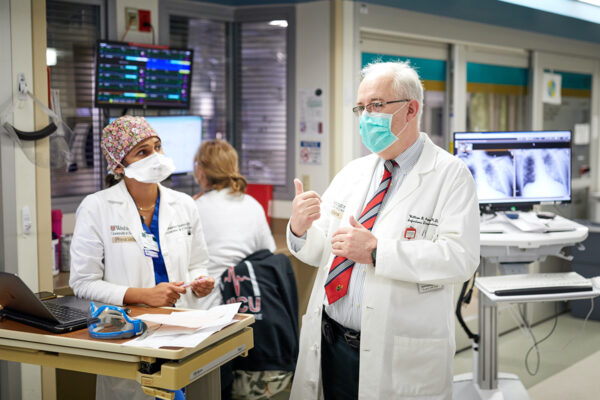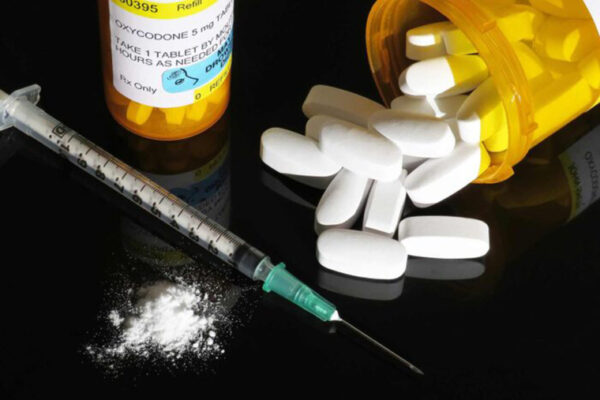To help understand the complex factors that contribute to human health and disease, Washington University School of Medicine in St. Louis has joined the All of Us Research Program, an initiative of the National Institutes of Health (NIH) that seeks to build a large, detailed biomedical data resource that reflects the breadth and diversity of the U.S. population.
The goal is to recruit 1 million people across the country to participate in the study. Such a large and diverse dataset will help investigators understand how biology, environment and behavior interact to influence health and disease. Washington University researchers will help enroll participants who represent the St. Louis region’s rich diversity.
“Participating in this type of research can benefit our community,” said Christina A. Gurnett, MD, PhD, director of the Division of Pediatric and Developmental Neurology at the School of Medicine and neurologist-in-chief at St. Louis Children’s Hospital. “We want to have our data counted because the only way we can improve health-care delivery is by having information about what works and what doesn’t for specific people. A dataset with electronic health record information and genetic information from many different people contributed over many years can help researchers look for patterns and tackle questions that couldn’t be answered before. There are systems in place to return genetic information to participants that could be beneficial to their health. In this program, research is a two-way street, and patients’ participation will benefit future generations.”
In an effort to reduce health disparities, the All of Us Research Program is making a specific effort to include communities that have been historically underrepresented in health research. Over 271,000 participants have completed initial enrollment steps, and about 80% of those come from underrepresented communities, including racial and ethnic minorities, sexual and gender minorities, residents of rural areas and older adults, among others.
The Washington University leadership team conducting the All of Us study includes Gurnett; Laura J. Bierut, MD, the Alumni Endowed Professor of Psychiatry; Joyce E. Balls-Berry, PhD, associate professor of neurology; and Philip R.O. Payne, PhD, director of the Institute for Informatics, and the School of Medicine’s associate dean for health information and data science, and chief data scientist.
“With the COVID-19 pandemic, we have had to move recruitment for this type of research into online and digital formats,” said Payne, also the Janet and Bernard Becker Professor. “We’re working to ensure that we can share health data from electronic health records in a way that improves our understanding of how to prevent, diagnose and treat disease, while also protecting the privacy of individuals who volunteer to participate in such research.”
To aid recruitment, Washington University will harness its Volunteer for Health program, a long-running community research registry that connects people who have volunteered to participate in health research with specific studies in which they are eligible to participate. These volunteers have expressed an interest in participating in health research and may find All of Us a new way to contribute.
The researchers emphasized the importance of gathering participants from diverse backgrounds across the country and in the St. Louis region. Knowledge gained from the program will only benefit diverse populations if the study participants reflect that diversity. The investigators also discussed the concerns some may have about joining a research program.
“It is important to address the legitimate concerns people may have about participating in health research,” Balls-Berry said. “We have ethicists working with us on this program, and local community members — as part of a community advisory board — have had input into the communications and recruitment materials. We must acknowledge our institution’s roles and responsibilities in making sure people are safe and ensuring that there are safeguards in place to protect participants’ privacy and health information. It is equally vital that those safeguards reflect the cultural sensitivities of the communities we serve. Participants will have a voice in this program, and there will be direct benefits to engaging in the research process.”
For example, the All of Us Research Program will be evaluating gene variations known to be associated with cancer or heart disease. Participants will receive information from the program over time, including information about their genes and about studies that use data collected by the All of Us program. Any genetic data returned to participants through the program will be those for which treatments or prevention strategies exist, and patients can choose to discuss these with their doctors.
Over the next decade, volunteers will be asked to contribute health information in the form of surveys, electronic health records, wearable technologies and biological samples such as blood, saliva and urine. Strict safeguards are in place to keep the samples and the data protected to maintain patient privacy. Data that can’t be linked back to individuals will be available to researchers who apply for access to the data and are approved to conduct studies investigating a broad range of medical conditions. The findings could lead to precision therapies for individual patients.
“The goal of this nationwide program is to make advances so we can tailor medical care to each specific person,” Bierut said. “Bringing together all of this work will accelerate medical breakthroughs and enable us to improve our understanding of genetic and environmental effects on health and disease. A key element of this program is that the participants are partners in the research. We want to utilize the powerful research engine at Washington University to generate new knowledge that benefits everyone in our St. Louis community.”
For more information about All of Us and to join, visit https://sites.wustl.edu/allofus/.
This work is supported by the National Center for Advancing Translational Sciences (NCATS) of the National Institutes of Health (NIH), grant number 3UL1TR002345-04S3.
All of Us is a service mark of the U.S. Department of Health and Human Services.
Washington University School of Medicine’s 1,500 faculty physicians also are the medical staff of Barnes-Jewish and St. Louis Children’s hospitals. The School of Medicine is a leader in medical research, teaching and patient care, consistently ranking among the top medical schools in the nation by U.S. News & World Report. Through its affiliations with Barnes-Jewish and St. Louis Children’s hospitals, the School of Medicine is linked to BJC HealthCare.



